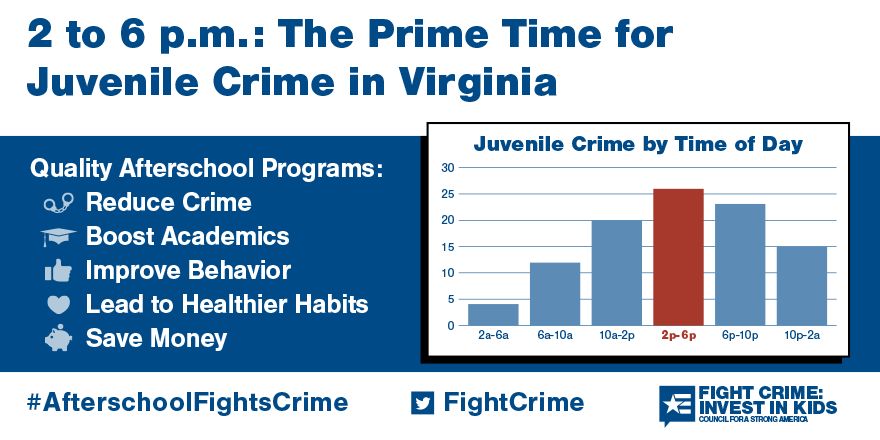After School: Still the Prime Time for Juvenile Crime in Virginia
Afterschool Fights Crime in Virginia
Related
The more than 5,000 law enforcement leaders around the nation who are members of Fight Crime: Invest in Kids, have long known that the hours immediately after school lets out, when parents are likely not available to supervise, are the prime-time for juvenile crime. Over the past 20 years, law enforcement leaders across the country have relied on high-quality afterschool programs to provide supportive, stable, and enriching environments with caring adults that keep children and youth out of trouble and safe, while supporting their academic success, and social and emotional development.
As this new report shows, the hours after school continue to be a time when juveniles are most likely to get involved with criminal activity. Afterschool programs help provide safe, constructive environments for kids to explore their interests and continue to learn.
Chief Eric English, Harrisonburg Police Department
The Prime Time for Juvenile Crime in Virginia

In Virginia, juvenile crime peaks from 2 to 6 p.m. on school days, with about 26 percent of all juvenile crime on those days occurring during the hours following the last school bell.
Program Highlight: On the Road Collaborative, Harrisonburg
In Harrisonburg, Virginia, On the Road Collaborative (OTRC) provides college and career readiness opportunities to underserved middle and high school students across three Harrisonburg City Public Schools. In addition to academic support, young people in the free afterschool program work on developing leadership skills, learn to make positive health decisions, and take part in 10-week long projects dedicated to introducing students to a range of career pathways. Career pathway projects have explored law, healthcare, aviation, and law enforcement, to name a few. Projects are led by local professionals to provide students with an in-depth look into the profession. For example, inside the healthcare career track, students were introduced to different healthcare professions, learning how to set a cast in orthopedics, running a relay race in physical therapy, performing an echocardiogram in the cardiac catheterization lab, and being taught about X-rays from lab technicians.
These types of programs not only impact our youth in a positive way, but it also impacts our city by developing our youth to be leaders in the community.
Chief Eric English, Harrisonburg Police Department
Program evaluations have found that 91 percent of students agree that “OTRC helps me think more positively about my future” and 87 percent agree that “OTRC helps me do better in school.” Harrisonburg Police Chief Eric English believes strongly in the program’s positive impact on both the students in the program and the Harrisonburg community at large, stating, “Programs such as On the Road Collaborative are not only a valuable tool for our kids, but the approach is very focused in order to guide our youth towards career paths. Anytime that programs can keep our youth occupied with positive activities is a plus as it eliminates some of the peer pressure that many of our kids face from being idle. These types of programs not only impact our youth in a positive way, but it also impacts our city by developing our youth to be leaders in the community.“
Download the Graphic
Read More About
States
